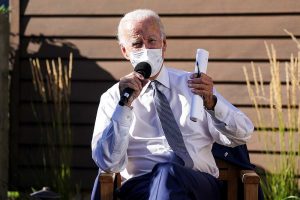
Democratic US presidential nominee and former Vice President Joe Biden speaks about safely reopening schools during a campaign stop in Wauwatosa, Wisconsin September 3, 2020.
KENOSHA: Democratic presidential nominee Joe Biden put himself squarely in the middle of ongoing national tumult over racial injustice and police brutality yesterday, meeting with residents of strife-torn Kenosha, Wisconsin, and speaking by phone with the Black man shot there by police.
Biden’s trip to Kenosha, the site of sometimes violent protests since Jacob Blake was shot in the back several times by a white police officer on Aug. 23, came two days after President Donald Trump travelled to the city.
The two visits had starkly different tones. Biden met privately with Blake’s family on the grounds of the Milwaukee airport, and the former vice president also spoke with Blake, who is hospitalized, on the phone for about 15 minutes.
Trump’s visit on Tuesday, by contrast, was intended to convey support for police, and the president did not meet with Blake or his relatives.
After arriving at the Grace Lutheran Church in Kenosha, a somber Biden listened as local elected officials, business owners and current and former law enforcement members told stories of a resilient community beaten down by racial divides and civil unrest.
Porsche Bennett, a Black Lives Matter organiser, said local Black residents were tired of false promises of police reform.
“We have yet to see action. And I was always raised to go off action, not words,” Bennett told Biden, who did not respond.
A small business owner, Barb DeBerge, told him that her business was at risk amid the violent protests but was spared heavy damage.
Biden, wearing a mask because of the coronavirus pandemic, condemned the destruction. “Regardless of how angry you are, if you loot or you burn you ought to be held accountable,” he said. “Period. It just cannot be tolerated, across the board.”
But he also praised the Black Lives Matter movement, saying Trump had not succeeded in swaying public opinion against the protests.
Trump on Tuesday toured a Kenosha furniture store that was destroyed in the upheaval and has maintained that Democrats like Biden condoned the violence and were influenced by left-wing activists.
Trump has declined to condemn violent acts by his supporters and defended a 17-year-old Blue Lives Matter supporter that has been charged with killing two people and wounding another with a semi-automatic rifle during a clash with Kenosha protesters.
A shift for Biden
The visit marks a distinct change in campaign tactics for Biden, who has mostly avoided travelling far from his Delaware home, arguing the coronavirus pandemic required caution. The community meeting in the church was the largest group Biden had addressed in person in months.
The protests that have flared nationwide since Minneapolis police killed George Floyd in May have placed the Democrat in a difficult political position at times. Along with his running mate, Kamala Harris, Biden has praised the energy of the Black Lives Matter movement, but has not embraced its goals of de-funding or even eliminating local police departments.
Wisconsin is a critical battleground in the fight for the White House. Trump edged out Democrat Hillary Clinton there four years ago, and while opinion polls show Biden with a lead in the state, Trump’s campaign has made retaining it a top priority.
Trump will visit another swing state crucial to his re-election when he makes a campaign stop in Latrobe, Pennsylvania, later yesterday.
Trump won Pennsylvania by just 45,000 votes in 2016. Recent polls show him trailing Biden in that state as well, although there are indications the race there is tightening.
Beyond responding to the protests, both Biden and Trump have given the Midwest renewed attention in recent days.
The Trump campaign launched new ads in five early voting states emphasizing his “law and order” message, including in Wisconsin and Minnesota.
Biden has begun running coronavirus-themed ads in Michigan, Pennsylvania and Wisconsin that show empty football stadiums while also launching a new set of ads concerning racial justice and police reform.
A new Reuters/Ipsos poll released on Wednesday showed that most Americans do not see crime as a major problem confronting the nation and a majority remain sympathetic to anti-racism protests. By contrast, a large majority of Americans said they remain “very” or “somewhat” concerned about the pandemic.
